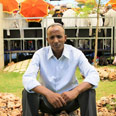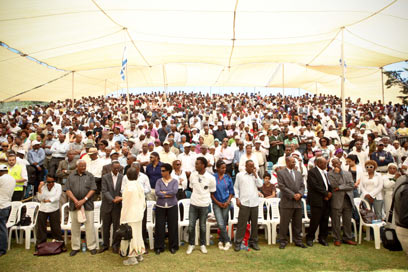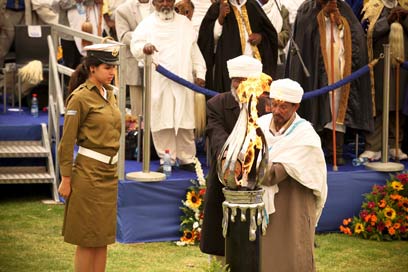
Madi Maharat. Made the trek at age 14
צילום: נועם מושקוביץ
Ethiopians lost in exodus to Israel memorialized
State holds memorial ceremony for 4,000 members of Ethiopian Jewish community who died making their way to Jewish state. Madi Maharat, whose mother died during grueling journey, says, 'It's a difficult subject to talk about. Some young Ethiopians have never heard about it'
Some 4,000 people from the Ethiopian Jewish community perished on their journey to Israel. On Wednesday, the State marked the official memorial day for those who were unable to fulfill their dream of moving to Israel.
Madi Maharat, 40, arrived in Israel in 1984 with his sister and brother. His father died when he was a baby. In a conversation with Ynet, Madi said that he made the trek to Israel with his uncles at the age of 14. His mother tried to make aliyah to Israel together with his brothers and 53 others, but was caught and put in jail. After two and a half years in jail, she died. The rest of the people apprehended were released five years later, and ultimately made it to Israel in 1990.
Maharat said with great sorrow that many young people, including young Ethiopians, are unfamiliar with this history. In his opinion, the Education Ministry should put the subject in the curriculum.

Thousands in attendance. 'Not one family didn't lose loved ones' (Photo: Noam Moskowitz)
"They don't know what we went through. There is no Ethiopian family that did not lose a dear one or a friend," he said.
"It is a very difficult subject to speak about," asserted Maharat. "In our family, we rarely speak about it. Therefore, not only native-born young people don't know about this history, but even many Ethiopian youth have never heard about it. It is the moral obligation of the State of Israel to put these events into the education system."
Ronit Barro, 39, a nurse at an infant health center and mother of four, lost her mother when she was 8 years old. She moved to Israel together with her four brothers and her grandparents. Her mother died on the way.

Ceremony on Mount Herzl on Wednesday (Photo: Noam Moskowitz)
On Wednesday's memorial ceremony on Mount Herzl, Barro read a moving letter to her late mother that recounted her aliyah story: "My dear mother, I would like to tell you that your daughters, who were on the verge of death there, in the place you were taken, grew up into daughters you can be proud of. The irony of fate is that you, the strong one, remain there, while we, the weak ones, fulfilled your dream of moving to Israel."
Knesset Member Shlomo Molla lost his little brother, Eyal, who died on the way to Israel. Had he survived, he would have been 32 today.
In a conversation with Ynet, MK Molla said, "Today, my little brother could have studied and started a family, but he sacrificed his life together with thousands of others for the Zionist dream and for Jerusalem. When I was a high school student, we learned a lot about the many immigration waves to the Land of Israel, but there was no mention of the aliyah from Ethiopia. Even today, 25 years later, they still don't learn the story of this amazing aliyah."
The Absorption and Immigration Ministry erected a monument on Mount Herzl in memory of those who perished during the trek to Israel and holds an annual memorial ceremony.
Absorption Minister Sofa Landver said during the ceremony, "This journey is the closest to the story of the exodus from Egypt. The price of the exodus from Ethiopia was especially high. I do not ignore the problems, but many members of the community, who not too many years ago were immigrants themselves, became the ones to absorb immigrants. The aliyah operation has yet to be completed. Some of the Jews of Ethiopia are still held in camps under very difficult conditions. I soon will fly to Ethiopia to try and expedite their arrival."
President Shimon Peres said during the ceremony, "Jerusalem, which the immigrants dreamed of, salutes with honor those who fell. I heard with absolute disgrace about the nursery school "Otzar Haim" in Beersheba, which separated between children on a basis that we will never be able to make peace with. I was no less horrified by the rejection of Ethiopian children from the school in Petah Tikva. Discrimination is a disgrace to the Torah, and shames the country. There is, and rightly so, only one Israel, equal and just for everyone."
Ronen Medzini contributed to this report










